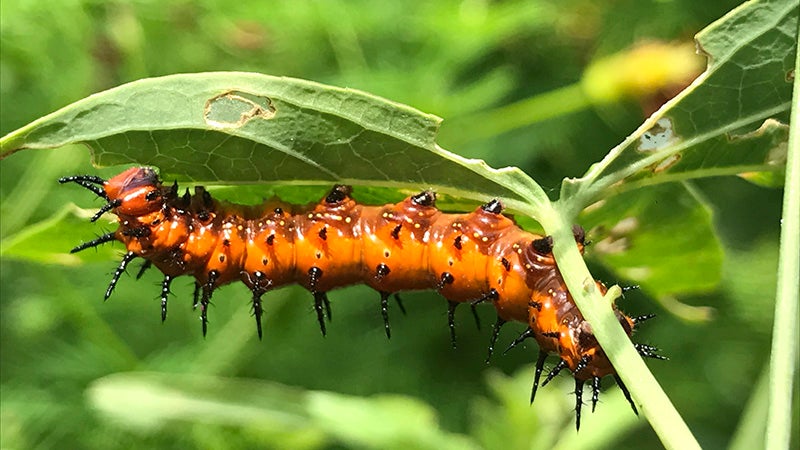Arboretum Paths: Have you been seeing caterpillars lately?
Published 7:00 am Wednesday, September 5, 2018

- NOT SHARP: The gulf fritillary caterpillar can look scary and appears to have spikes, but they are not sharp. Their appearance makes them unattractive to predators. Submitted photo
By Patricia R. Drackett, Director and Assistant Extension Professor of Landscape Architecture
The Crosby Arboretum, Mississippi State University Extension Service
Have you been noticing an abundance of caterpillars and butterflies lately? Not only is the Arboretum’s pollinator garden and savanna brimming with blooms and fluttering butterflies, but other life stages of these insects can also be seen.
Many of us like to watch butterflies visiting the garden. Common species are gulf fritillaries, skippers, hairstreaks, sulphurs, common buckeyes, monarchs, and many kinds of swallowtails. You may know that milkweed is the only host plant for monarch butterfly caterpillars, and following this example, it is important to know which plants will attract butterflies to your garden to lay their eggs on. Once the eggs hatch, the emerging (very hungry) caterpillars will devour the “host plant”.
But unless you do some reading or have a friend who is a butterfly fan, you will not know the specific plant species that will attract certain butterflies. Flowers produce sweet nectar, which butterflies and other insects consume for their “fuel”. If you attract butterflies to your property with nectar plants such as butterfly weed, black-eyed Susan, Coreopsis, ironweed, and clover, be sure to provide some host species also, so they will stick around longer!
Visit the Mississippi State University Extension website to search for and download an excellent fact sheet, “Attracting Butterflies to Mississippi Gardens” (http://extension.msstate.edu/
Recently, a generous friend gave me some giant swallowtail caterpillars. Although I thought all I needed to do was relocate them to the water cowbane in the Arboretum’s pitcher plant bog. But after doing my research, I realized I’d incorrectly assumed all swallowtails consumed members of the carrot family (Umbelliferae) such as dill, parsley, celery, and the water cowbane in our bog.
In my reading, I was surprised to learn that giant swallowtails ate only citrus and a few other obscure native plants which I had no idea where to find. After exhausting my mental list of friends with citrus trees, and being unable to watch these swallowtail caterpillars perish (which resemble bird poop – look them up), I contacted Linda Auld, the “Bug Lady” of New Orleans, who called her friend Dorothea Munchow who thankfully said she would be happy to adopt the caterpillars and release them on her many citrus trees.
Although it was unplanned, I thoroughly enjoyed my Sunday journey to New Orleans and the chance to see Dorothea’s yard, which is chock-full of butterflies, host and nectar plants. Her passion vine was surrounded by gulf fritillary butterflies. On the side of her house, fritillary caterpillars crawled, passing by their chrysalises. Your yard, too, can be a haven for butterflies, by adding the plants they prefer!
Visit the MSU Extension website mentioned above for information specific to our state, or a web such as the North American Butterfly Association (https://www.naba.org/) to learn more.
Take a walk along our trails to see butterflies and you’ll notice the Arboretum is filling up with scarecrows. Some of these creations have a brief stay in our Visitor Center, and they can be startling to see when you are rounding a corner, as some are life-size and quite realistic! The deadline for accepting entries has been extended until September 9, so there is still time for your family, club, group, or business to build a scarecrow(s) to be displayed along our pathways during the months of September, October and November, along with a sign if you wish, recognizing your group or family. For more information please contact Kim Johnson at 601-799-2311 or kim.johnson@msstate.edu<
In celebration of caterpillars, and our upcoming BugFest event, a “Sock Caterpillars” children’s craft program will be held this Saturday, September 8 from 10:00 AM, led by Arboretum staff member Kim Johnson. As children must be accompanied by an adult, there is no minimum age requirement. Space is limited, and reservations requested. Call 601-799-2311 to sign up now. Members’ children $4; non-members’ children $6 (no charge for adults).
Mark your calendar for BugFest on September 21 and 22, and our big Fall Native Woody Plant Sale on October 5-6 (Friday and Saturday). A floral design workshop with horticulture professor Dr. James Delprince will be held during the sale on Saturday, October 6.
For more information on our activities and visiting the Crosby Arboretum, see our Facebook page or website (www.crosbyarboretum.msstate.




